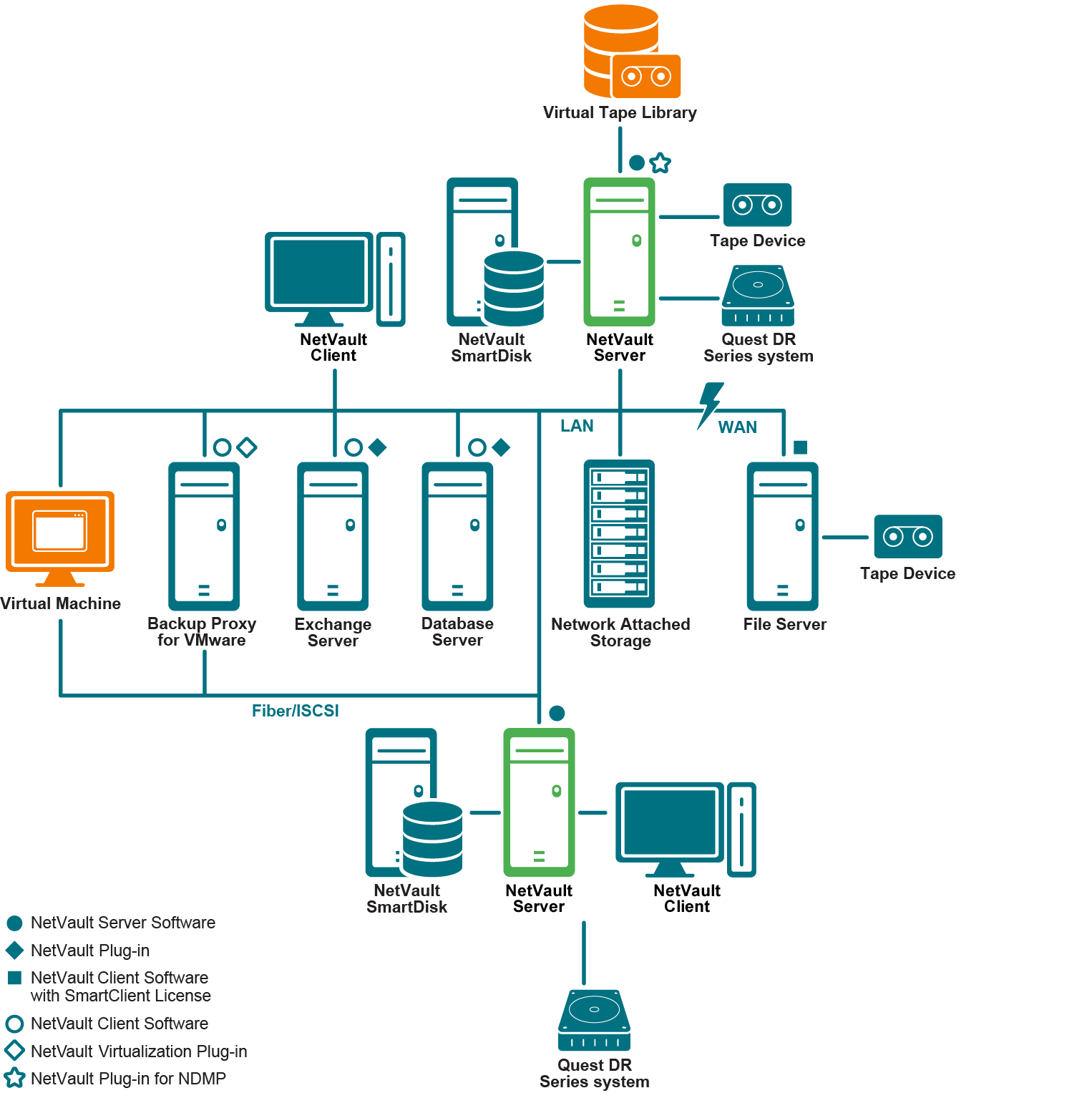Recommended additional reading
|
• |
Quest NetVault Administrator’s Guide: This guide describes how to configure and use NetVault to protect your data. It provides comprehensive information about all NetVault features and functionality. |
|
• |
Quest NetVault CLI Reference Guide: This guide provides information about using the NetVault command-line utilities. |
|
• |
Quest NetVault Plug-in for FileSystem User’s Guide: This guide provides information about installing, configuring, and using NetVault Plug-in for FileSystem. |
|
• |
Quest NetVault Built-in Plug-ins User’s Guide: This guide provides information about configuring and using the following plug-ins: |
|
• |
NetVault Plug-in for Consolidation |
|
• |
NetVault Plug-in for Data Copy |
|
• |
NetVault Plug-in for Databases |
|
• |
NetVault Plug-in for Raw Devices |
|
• |
Quest NetVault Compatibility Guide: This guide provides information about the platforms, operating system versions, and application versions that are supported by NetVault. |
You can download these guides from https://support.quest.com/technical-documents.
Deploying NetVault
About deploying NetVault
The following diagram depicts a NetVault deployment.
NetVault components
A NetVault deployment consists of the following components:
The NetVault Server provides the core services for protecting your data.
The NetVault Server can run on Windows and Linux operating systems.
NetVault offers the following types of built-in plug-ins:
|
• |
NetVault Plug-in for FileSystem (Plug-in for FileSystem): The Plug-in for FileSystem protects critical file system data, and minimizes downtime by allowing you to restore full volumes, individual partitions, or individual directories and files quickly and reliably with minimal interaction. |
|
• |
NetVault Plug-in for Consolidation (Plug-in for Consolidation): The Plug-in for Consolidation lets you create a composite saveset by combining a Full Backup and its associated Incremental Backups. You can use this consolidated saveset as the base for subsequent Incremental Backups. The Plug-in for Consolidation does not back up data from a client; it just creates a composite set from existing savesets. |
|
• |
NetVault Plug-in for Data Copy (Plug-in for Data Copy): The Plug-in for Data Copy lets you create one or more copies of backups for off-site storage and disaster recovery purposes. The Plug-in for Data Copy does not back up data from a client; it just creates a copy of an existing backup. |
|
• |
NetVault Plug-in for Databases (Plug-in for Databases): The Plug-in for Databases protects system data (such as configuration files, system settings, backup indexes, backup media information, job schedule, licenses, and other data) stored in the NetVault Database. You can use this backup to recover a functional NetVault Server after a failure. |
|
• |
NetVault Plug-in for Raw Devices (Plug-in for Raw Devices): The Plug-in for Raw Devices protects data stored on physical disks. The plug-in lets you recover the Master Boot Record (MBR), system partitions, and individual user partitions from a point-and-click user interface without writing any complex scripts. |
|
• |
Quest NetVault Plug-in for Rapid Data Access (Plug-in for RDA): The Plug-in for RDA lets you use the client-side and inline deduplication capabilities that are available in other products, such as the Quest DR Series system of deduplication appliances and the software-defined Quest QoreStor storage devices (Linux only). |
|
• |
NetVault Plug-in for Encryption (Plug-in for Encryption): The Plug-in for Encryption lets you choose from three encryption algorithms — CAST-128, CAST-256, and AES-256 — to encrypt and transfer data across the network to the backup device, where the data remains encrypted until restored to the client. |
For more information about built-in plug-ins, see the Quest NetVault Plug-in for FileSystem User’s Guide and Quest NetVault Built-in Plug-ins User’s Guide.
NetVault offers the following types of licensed plug-ins:
|
• |
Plug-ins for applications: These plug-ins provide data protection to business-critical applications, such as Oracle, SQL Server, Exchange, SharePoint, MySQL, PostgreSQL, Domino, DB2, Informix, SAP, and Sybase. |
|
• |
Plug-ins for NDMP-based NAS appliances: These plug-ins enable NDMP-based backups and restores for appliances that support this protocol. NetVault also offers specialized plug-ins that integrate the NetApp SnapMirror, SnapVault, and Snapshot technologies to provide advanced data protection to NetApp appliances. |
|
• |
Plug-ins for virtual environments: These plug-ins provide data protection to virtual machines in VMware and Hyper-V environments. |
|
• |
Plug-ins for device integration: These plug-ins enable configuration of specialized tape libraries for use in a NetVault environment. |
|
• |
Plug-ins for bare metal recovery: These plug-ins let you recover an entire system, including the operating system, applications, system settings, partition information, and data on supported Windows and Linux operating systems. |
For more information about the licensed plug-ins, see the respective plug-in user’s guide.
You can use the NetVault WebUI to perform various tasks such as the following:
You can use the NetVault CLI utilities to perform various tasks such as the following:
The NetVault command-line utilities can be accessed from the NetVault Server and Client machines. For more information about the command-line interface, see the Quest NetVault Command Line Interface Reference Guide.

